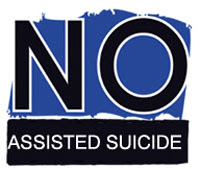 By Alex Schadenberg
By Alex Schadenberg
Ballot Question 2 (assisted suicide) was defeated in
Massachusetts on
November 6 by a vote of 51.1% to 48.9%. This is a huge victory based on the fact that polling in June 2012 indicated that 68% of the people in
Massachusetts supported assisted
suicide and only 19% opposed it.
The assisted suicide referendum was defeated because
there were many people who worked together to oppose assisted suicide from
different perspectives. There were three main groups who opposed Question 2 and several others who influenced the outcome of the
vote.
 |
| Pharmacist Commercial |
The Committee Against Physician
Assisted Suicide raised significant money. They developed one radio commercial,
three TV commercials and a very effective hand-out.
The No on Question 2 campaign ran a great campaign and
developed a TV commercial. They also instituted a very effective “get out the
vote” strategy.
 |
| John Kelly |
Second Thoughts, a disability rights group that was led
by John Kelly, were effective in every debate. Kelly was also a spokesperson for
the No on Question 2 campaign. Second Thoughts are connected to the
“progressive” elite in
Massachusetts .
Defeating the assisted suicide referendum in
Massachusetts was
done by focusing on what the law would actually do. Early polling indicated that
if this were a referendum over whether or not people supported assisted suicide
that we would lose.
The campaign was able to convince people that the
statute was not safe.
There are several key flaws in the assisted suicide
statutes in the states of
Oregon and
Washington and by focusing on
these specific flaws they were able to convince ‘soft’ supporters of assisted
suicide to vote no.
 |
| Margaret Dore |
Margaret Dore, the leader of
Choice is an Illusion is a key person at identifying the flaws in the assisted
suicide statutes. Dore has effectively analyzed the
statutes and developed campaign style ideas to convince the public that assisted
suicide is not safe.
The campaign was successful at getting the media onside.
Nine newspapers took an outright NO position on Question 2 and one newspaper
clearly supported assisted suicide but was NO position on Question 2. This was
an unprecedented success and it was accomplished by the campaign developing
effective messages and sticking to them.
Tim Rosales, from the No on Question 2 campaign
indicated that message discipline was a key to their success.
 There was a lot of good experience gained in the campaign to defeat assisted suicide in
There was a lot of good experience gained in the campaign to defeat assisted suicide in
New information indicates that the assisted suicide lobby is also targeting: Hawaii, Connecticut, New Mexico, Vermont, Montana, California and New York.
Canadians should also be concerned. The spokesperson for
the Death with Dignity campaign in
Massachusetts told
the media the day after Question 2 was defeated that they would be helping the
Canadian assisted suicide lobby.
Lessons from the
Massachusetts
campaign:
- Work with a diverse group of people both independently and in coalition.
- Develop a set of effective messages and maintain message discipline.
- Focus on the actual proposed statute and not assisted suicide itself.
- Raise as much money as possible, and then raise more money.
- Terminology, use the term assisted suicide and not doctor prescribed death.

No comments:
Post a Comment